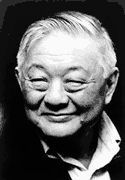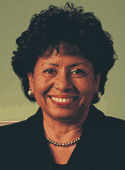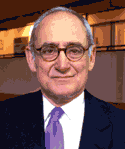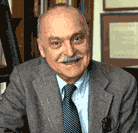
 |
||
The Yale Alumni Magazine is owned and operated by Yale Alumni Publications, Inc., a nonprofit corporation independent of Yale University. The content of the magazine and its website is the responsibility of the editors and does not necessarily reflect the views of Yale or its officers. |
History professor Donald Kagan was awarded the National Humanities Medal by President George W. Bush '68 and Laura Bush on February 27 at a White House ceremony. A leading authority on military history and the Peloponnesian War, Kagan was cited both for “his distinguished scholarship on the glories of ancient Greece” and his teaching. Kagan, a former dean of Yale College, was named a Sterling Professor last year; he was one of eight recipients of this year’s award.
A week after Kagan was honored at the White House, it was Ming Cho Lee’s turn. On March 6, the Bushes presented Lee, an adjunct professor of stage design at the School of Drama, with the National Medal of Arts. Lee, one of nine people to receive the medal, has been developing groundbreaking stage designs for regional theater since the 1960s, and he helped lead the field away from “poetic realism” to a more abstract modern approach. Lee has taught at Yale since 1969 and holds the Donald Oenslager professorship.
Actor Christopher Reeve blasted the Bush administration’s policy on embryonic stem cell research in a talk at the Medical School on April 3 and criticized religious groups opposed to such research. “Social and religious conservatives have had undue influence on the critical debate,” said Reeve, who has become a spokesperson for stem cell research since a riding accident eight years ago left him paralyzed. “In matters of public policy, no religious group should have a seat at the table.” Reeve’s talk was the seventh in a series sponsored by the Medical School’s Stem Cell Interest Group.
Ruth Simmons, the president of Brown University, defended affirmative action in college admissions at a Chubb Fellowship talk on April 9. Simmons stressed that personal qualities, as well as economic, ethnic, or other forms of disadvantage, should play a major role in determining an applicant’s qualifications. While she said that affirmative action “needs to continue to evolve,” she called it “one of the most important and far-reaching government policies of our time.”
Architect Robert A. M. Stern, nearing the end of his five-year term as dean of the School of Architecture, is coming back for more. President Richard Levin has appointed Stern to a second five-year term, saying that the School’s faculty held “the unanimous view that Dean Stern has raised the School’s profile, infused it with energy, and restored its ability to attract the very best students.” In addition to his work as an architect, Stern is widely known as a scholar of architectural history and a champion of historic preservation
At the end of the 1991 Gulf War, when President George H.W. Bush '48 called on Iraqi citizens to rise up against Saddam Hussein, Zainab Al-Suwaij was one of the first women in the streets of Karbala. “We faced soldiers' bullets with sticks and kitchen knives,” Al-Suwaij said in a talk to the Yale College Students for Democracy on April 1. When the uprising failed, she went into hiding for two months before leaving Iraq. Al-Suwajj, who heads the American Islamic Congress, encouraged students to “see yourself as someone with a role to play in Iraq” as the nation builds democratic institutions. Close-Up
The death of Georges May on February 28 came as Americans were renaming french fries as a result of France’s opposition to war in Iraq. It brought to mind one of the many things worth remembering about May, the witty, gracious French scholar who served as dean of Yale College from 1963 to 1971 and provost from 1979 to 1981: his service in two Allied armies in World War II. Born in Paris in 1920, May served in the French army at the beginning of the war before studying in Montpellier and then escaping to America. When he got here, he enlisted in the U.S. Army and worked in military intelligence for the rest of the war. May came to Yale in 1946, where he made his reputation as a scholar of the French Enlightenment with particular emphasis on Denis Diderot and Jean-Jacques Rousseau. He was named a Sterling Professor of French in 1971. But a generation of undergraduates knew May as the erudite, pipe-smoking dean who presided over a time of tumult and change—most notable perhaps, the advent of coeducation, which he strongly supported. May’s friend John Morton Blum, the Sterling Professor Emeritus of History, said that May “epitomized the best of Western civilization. He combined the most distinctive and excellent qualities of the French and American spirit.” |
||||||||||||||||
|
|
|
|
|
|
|
|
©1992–2012, Yale Alumni Publications, Inc. All rights reserved. Yale Alumni Magazine, P.O. Box 1905, New Haven, CT 06509-1905, USA. yam@yale.edu |
||






